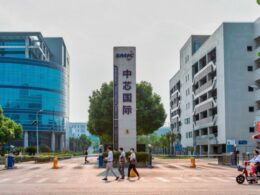Unlock the Editor’s Digest for free
Roula Khalaf, Editor of the FT, selects her favourite stories in this weekly newsletter.
By most metrics of a start-up ecosystem, Silicon Valley comes out on top. It produces more “unicorns”, sucks in more investment, wins higher valuations and attracts the best talent, and has done so broadly uninterrupted since the 1980s.
So it is surprising that research from King’s Business School in London argues that south-east Asia’s tech scene could achieve greater success by following innovation strategies from Japan or South Korea.
Despite its dominance, Silicon Valley’s zero-sum approach — where disruptive start-ups challenge and replace incumbents — is not the only model. It differs from open innovation strategies in countries such as Japan and South Korea, where big businesses tend to collaborate with start-ups. There, start-ups often function as boosters for the competitiveness of big established companies, rather than as challengers to them.
This collaboration — with start-ups injecting “innovative DNA” while benefiting from conglomerates’ supply chains, distribution networks and customers — could serve as a model for south-east Asia’s nascent start-up scene, according to Robyn Klingler-Vidra, associate professor of political economy and entrepreneurship at KBS, who with her colleague Professor Ramon Pacheco Pardo co-authored the research in a forthcoming book.
“We see the Silicon Valley approach as somewhat outdated and tied closely to the unique economic conditions of the US in the latter half of the 20th century. Now, Silicon Valley’s start-ups are giants and business dynamism, both growth and failures, has been declining,” Klingler-Vidra says. “The more collaborative approach in Japan and South Korea offers an alternative that allows large companies to stay competitive in fast-changing markets while providing start-ups with the resources and networks they need to scale.”
While the study also looked at China and Taiwan, their start-up models are more hybrid and complex. In Japan and South Korea, open innovation to benefit big business and start-ups plays out more clearly.
In the context of Silicon Valley’s exceptional ability to mobilise capital and resources, Klingler-Vidra and Pardo make a bold claim. While big corporations are involved with start-ups in Silicon Valley through corporate venture capital, accelerators or as judges on start-up panels, their aims are not always transparent. Pardo says: “Governments in Korea and Japan realise they cannot overhaul the economic structure that has been in place for decades. So, in a sense, they don’t pretend that they want start-ups to challenge incumbents to the extent that they [the big companies] will essentially go bust.”
The academics also acknowledge the risks when mixing big business with start-ups, such as theft of ideas and pressure for early acquisitions. “Of course there must be robust legal frameworks to protect both parties. Overall the potential gains from bringing them together outweigh the potential risk,” Klingler-Vidra adds.

Recent examples of east Asian collaboration include Toyota’s $44.4mn investment (via subsidiary Woven) in Japanese start-up Interstellar Technologies, which will facilitate mass production of rockets while enabling Toyota to expand in the space industry and contribute to Japan’s ambitions in the sector.
Tokyo is transparent about the role of corporations in the country’s five-year startup development plan. Ryohei Gamada who works with Japanese and overseas start-ups at Japan’s external trade organisation, Jethro, said: “Open innovation promotion with corporates is the third pillar of Japan’s startup development plan.”
In South Korea, the government’s “Deep Tech Value-up” programme focuses on late stage start-up investment in sectors including AI, biotech and green tech. Participants include: Hyundai Motor and Samsung Electronics among others.
Japanese and South Korean corporations are among the most active corporate VCs, with five in the top 11 around the world in the final quarter of 2024, according to CB Insights. Conor Moore, head of private enterprise at KPMG, puts this down to “a desire by certain countries to catch up with other ecosystems”. And, overall, their investment represents a fraction of wider VC funding which, with shorter investment cycles, may be more suited to start-ups.
In Startup Genome’s ranking of global startup ecosystems last year, Tokyo and Seoul were the biggest movers in the top ten, reaching tenth and ninth place respectively. Silicon Valley remained at the top.
South-east Asia’s tech scene is growing rapidly. Indonesia is emerging as a leading fintech hub while Malaysia led south-east Asia in IPO fundraising in 2024. In the Philippines, government support extends to a start-up venture fund which raised $245mn in 2024.
Klingler-Vidra says she hopes to see more south-east Asian governments partner with large companies, offering tax incentives for corporate investment in start-ups, similar to Japan’s J-Startup Initiative and the K-Startup Grand Challenge in Korea.
As to whether south-east Asia can learn from Japan and South Korea, Tim Jackson, an active early-stage start-up investor since 2000 who runs the Walking Ventures seed fund in London, is sceptical. However, he believes AI could change the start-up dynamics in Asia’s favour. “AI enables companies to build MVPs (minimum viable products) much more cheaply, more quickly and with fewer workers, reducing the need to be close to Silicon Valley for funding and talent. That could be a big advantage for Asian start-ups,” he says.
Source link









